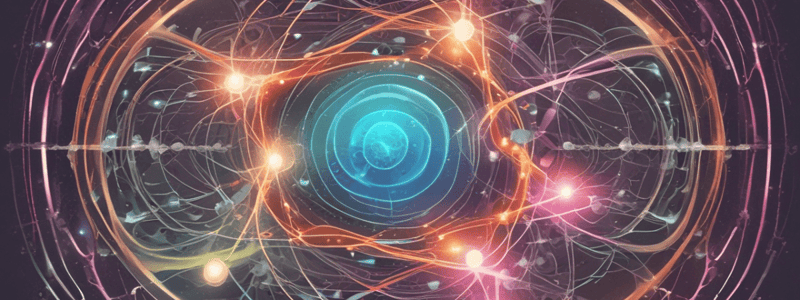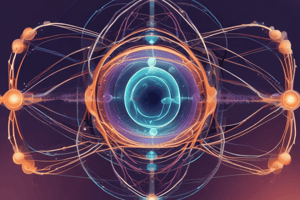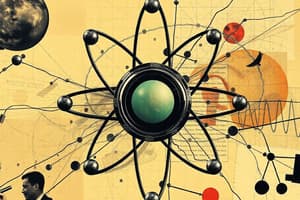Podcast
Questions and Answers
What occurs when two materials are rubbed together and electrons are transferred?
What occurs when two materials are rubbed together and electrons are transferred?
- Both materials lose protons.
- One material becomes positively charged, and the other negatively charged. (correct)
- Both materials become neutral.
- Both materials gain electrons.
What does the Law of Conservation of Charge state?
What does the Law of Conservation of Charge state?
- The total electric charge in an isolated system is constant. (correct)
- A positively charged object can become neutral by gaining electrons.
- Electrons can disappear when traveling through air.
- Charges are created when two objects touch.
What type of force occurs between two charged objects with the same charge?
What type of force occurs between two charged objects with the same charge?
- Their forces cancel each other out.
- They experience no force.
- They attract each other.
- They repel each other. (correct)
How does the electrostatic force change as the distance between charges decreases?
How does the electrostatic force change as the distance between charges decreases?
Which of the following statements about electrostatic attraction is true?
Which of the following statements about electrostatic attraction is true?
What phenomenon is demonstrated when a person's hair stands on end after interacting with a van de Graaff generator?
What phenomenon is demonstrated when a person's hair stands on end after interacting with a van de Graaff generator?
What causes a lightning bolt to form during a thunderstorm?
What causes a lightning bolt to form during a thunderstorm?
What happens to an atom when it gives up electrons?
What happens to an atom when it gives up electrons?
In the context of static electricity, what is meant by a 'charged particle'?
In the context of static electricity, what is meant by a 'charged particle'?
What causes different charges to attract each other?
What causes different charges to attract each other?
What property is measured in units of Coulombs?
What property is measured in units of Coulombs?
Which particles within an atom have no charge?
Which particles within an atom have no charge?
Which of the following is true regarding a neutral atom?
Which of the following is true regarding a neutral atom?
What is the charge of a proton?
What is the charge of a proton?
What happens when electrons are added or removed from an atom?
What happens when electrons are added or removed from an atom?
What type of charge do electrons carry?
What type of charge do electrons carry?
How do protons and electrons compare in terms of charge?
How do protons and electrons compare in terms of charge?
What is the mass of an electron?
What is the mass of an electron?
Which particle has a mass of 1.67 x 10^-27 kg?
Which particle has a mass of 1.67 x 10^-27 kg?
When an atom becomes an ion, what type of charge does it have?
When an atom becomes an ion, what type of charge does it have?
Flashcards are hidden until you start studying
Study Notes
Electric Charge Definition
- Matter consists of atoms, which contain electrons, protons, and neutrons.
- Protons (positive charge) and neutrons (neutral) are found in the nucleus, while electrons (negative charge) orbit around the nucleus.
- Electric charge is a fundamental property of matter, measured in Coulombs.
- Protons and electrons are the smallest charged particles, each with an elementary charge of e = 1.602 x 10^-19 C.
- Atoms are usually neutral, with equal numbers of protons and electrons resulting in a net charge of zero.
Characteristics of Protons, Electrons, and Neutrons
- Proton: Mass = 1.67 x 10^-27 kg; Charge = +1.602 x 10^-19 C.
- Electron: Mass = 9.11 x 10^-31 kg; Charge = -1.602 x 10^-19 C.
- Neutron: Mass = 1.67 x 10^-27 kg; Charge = 0 C.
Accumulation of Electric Charges
- Certain atoms can easily gain or lose electrons, resulting in ions with a net charge.
- Loss of electrons leads to a net positive charge; gain of electrons results in a net negative charge.
- Rubbing materials together can transfer electrons, creating static electric charges, as seen when a balloon rubbed on hair acquires negative charge while hair becomes positively charged.
Law of Conservation of Charge
- When two objects exchange electrons, the total electric charge remains constant.
- The Law of Conservation of Charge states that charges cannot be created or destroyed, only transferred.
Attraction and Repulsion of Charges
- Opposite charges attract; like charges repel.
- The strength of electrostatic force depends on the magnitudes of the charges and the distance between them.
- Charged objects exert forces that can cause significant effects, as observed with the behavior of hair when charged.
Electrostatic Attraction and Repulsion
- Electrostatic Attraction: Occurs between charged objects with opposite charges, pulling them together with an increasing force as they get closer.
- Electrostatic Repulsion: Occurs between objects with like charges, pushing them apart; the force strengthens as they draw nearer.
Example: Lightning
- Thunderstorms create charge buildup in clouds due to movement of water droplets.
- Opposite charges in clouds attract, while like charges repel, leading to a discharge of energy in the form of lightning.
- Lightning is powerful, capable of causing fires, injury, and disrupting electrical systems on Earth.
Studying That Suits You
Use AI to generate personalized quizzes and flashcards to suit your learning preferences.




